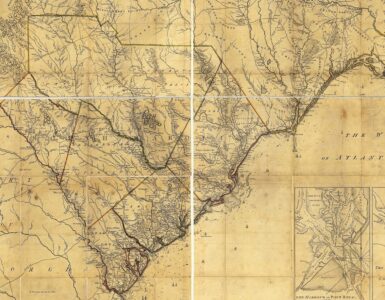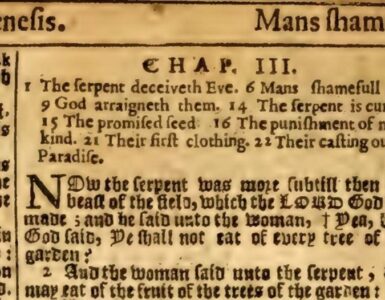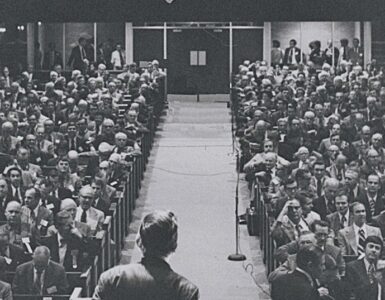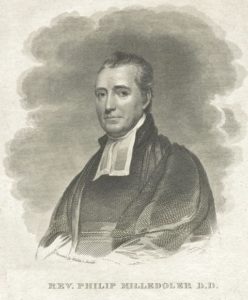 Philip Milledoler was born in Rhinebeck, New York (about a hundred miles north of New York City), to John and Anna on September 22, 1775. John had emigrated from Berne, Switzerland and married Margaret Mitchell, March 9, 1760. Margaret’s ancestors emigrated from Zurich, Switzerland. The family had moved from New York to Rhineback anticipating the conflict with Great Britain regarding independence. John’s brother-in-law was Captain Crowley of the Massachusetts Artillery and when he moved to Boston to lead his troops in battle, the Milledolers sent eight-year-old Philip along so he could access better schooling opportunities. He returned home after a few years of study and as a young teenager he attended a Methodist meeting and became a Christian. His studies continued with a classical teacher named James Hardie and the boy made sufficient progress to join the freshman class of Columbia College in 1789 at the age of fourteen. Columbia was founded as King’s College in 1754, but after the Revolution it reopened with its new name. He was a good student graduating with honors in May 1793; he presented his graduation oration on natural philosophy. The German Reformed Church on Nassau street served by John D. Gross, D.D. was his church home.
Philip Milledoler was born in Rhinebeck, New York (about a hundred miles north of New York City), to John and Anna on September 22, 1775. John had emigrated from Berne, Switzerland and married Margaret Mitchell, March 9, 1760. Margaret’s ancestors emigrated from Zurich, Switzerland. The family had moved from New York to Rhineback anticipating the conflict with Great Britain regarding independence. John’s brother-in-law was Captain Crowley of the Massachusetts Artillery and when he moved to Boston to lead his troops in battle, the Milledolers sent eight-year-old Philip along so he could access better schooling opportunities. He returned home after a few years of study and as a young teenager he attended a Methodist meeting and became a Christian. His studies continued with a classical teacher named James Hardie and the boy made sufficient progress to join the freshman class of Columbia College in 1789 at the age of fourteen. Columbia was founded as King’s College in 1754, but after the Revolution it reopened with its new name. He was a good student graduating with honors in May 1793; he presented his graduation oration on natural philosophy. The German Reformed Church on Nassau street served by John D. Gross, D.D. was his church home.
Philip Milledoler believed he was called to be a minister, so he began theological studies in preparation for examination and ordination. Pastor Gross instructed him in theology, but Philip turned to Columbia College’s John Christopher Kunze for instruction in Hebrew. Kunze was from Germany, had studied at the university in Leipzig, and then taught in the University of Pennsylvania before moving to Columbia. Gross was getting on in years and suffered from the weakness of age, so he was looking to retirement from his church ministry. The prime candidate to succeed him was Milledoler, and Gross knew it. While the two were on a trip to the meeting of the German Reformed Synod in Reading, Pennsylvania, Gross informed Milledoler that the church wanted him to be the next minister. Though reluctant, he agreed to accept the call, was examined during the synod meeting, and ordained May 21, 1794. Gross continued on for a time to ease the transition when Milledoler accepted the unanimously approved call issued May 6, 1795. The call required that he should preach in German three-quarters of the time and English the other quarter. Once ministry began he realized the situation was more difficult than expected and there were unanticipated problems in the congregation. But helping him through his work was Susan Lawrence Benson whom he married March 29, 1796.
Milledoler was facing some difficulties ministering to his congregation, but the specifics of the problems were not given in the sources. However, the issues may be indicated by the stipulation regarding preaching in German and English. The German Reformed Church, as the Reformed Dutch and Lutherans, struggled with maintaining its ethnic-linguistic identity while desiring to assimilate in the United States as Americans ministering to non-German people. The older church members tended to hold to the ways and language of their homeland, while the generations born in America were growing up in their country with its language and culture as their own. If this was the problem Milledoler faced, and it likely was, it led to his accepting the opportunity to visit Philadelphia and preach to the Pine Street Presbyterian Church which was without a pastor due to the recent death of John Blair Smith from yellow fever during the epidemic of 1799. He accepted the invitation and his preaching was appreciated greatly resulting in a unanimous call from the church issued August 11, 1800. The call was accepted and the Milledolers moved to Philadelphia in October. The situation for him was a good one, but it seems his former church could not agree on a candidate to replace him, so it extended a call for him to return three successive times over the period of a year. One of the calls was even delivered by his father to drive home the point. He turned them all down. Whatever led to his decision to leave the German Reformed Church, he knew without a doubt that he did not want to deal with it again.
Milledoler was enjoying a good ministry in Pine Street Church until he developed a problem with his head that he believed indicated the need to relocate to a different climate so he could recover his health. In February 1805, the Reformed Dutch Church in Harlem, New York (named for Haarlem in the Netherlands, New York was originally New Amsterdam), presented him a call having heard of his impaired health and desire to leave Philadelphia. While on his way to Harlem he was told by an acquaintance in New York that the Collegiate Presbyterian Churches, in particular the one on Rutgers Street (see regarding this church, John Rodgers, 1727-1811), was in need of a minister. In the end, it was not the Reformed Dutch but the Presbyterians who benefited from his visit because in August he accepted the Rutgers Street call. The Pine Street Church was reluctant to let him leave, but it recognized the severity of his health problem and acquiesced. During his installation service, November 19, 1805, the sermon was preached by the minister of the Wall Street Church, Samuel Miller. Milledoler had transitioned from one Calvinistic denomination, German Reformed, to another, the Presbyterian Church.
The Rutgers Street Church ministry returned him to familiar New York while alleviating his health problem. His work extended beyond the local church to his presbytery, synod, and general assembly. Even though he had been in the Presbyterian Church for only eight years, he was respected enough to be elected moderator of the Assembly in 1808. The Presbyterian Church in the United States of America (PCUSA) convened in First Church, Philadelphia for its annual gathering and Milledoler received the gavel from retiring moderator Archibald Alexander. A good bit of the Assembly’s time was spent deliberating theological education because the denomination was working through the complexities of establishing a seminary. Possibly the biggest issue was where it would be geographically with each of the nation’s sections appealing for a site conveniently located for its use. Education was a subject near to Milledoler’s heart and one he would have an important part in as the years passed. When he returned to Philadelphia for the General Assembly the following year his retiring moderator’s sermon was delivered from Matthew 24:45-47.
Who then is a faithful and wise servant, whom his Lord hath made ruler over his household, to give them meat in due season?
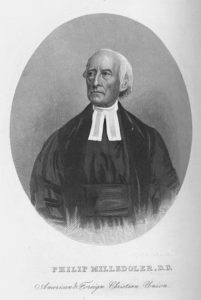 Milledoler was a very popular minister based on the number of pastoral calls he was offered, several of which have been left out of this biography because they went unaccepted. But one unaccepted call came from his previous ministry in Philadelphia. Archibald Alexander had resigned from Pine Street Church in the summer of 1812. The issue of theological education had been resolved by the General Assembly by locating the seminary in Princeton, New Jersey. Alexander became the first professor. Milledoler would have been returning to familiar and friendly ground if the Pine Street offer was accepted, but he turned it down. The reason is not given but fear his health problem would return may have contributed to his decision. But then another opportunity came when the Collegiate Dutch Church of New York offered a call. He wrestled with the decision and William B. Sprague notes that one of the factors contributing to his decision was the doctrinal controversy in the Presbyterian Church over Hopkinsianism and the New England Theology. Milledoler left Rutgers Street with a good legacy as is indicated by the 604 individuals admitted to membership during his tenure, August 1805 to May 1813. Sprague commented further that Milledoler’s ministry at Rutgers Street was “an almost constant revival of religion during nearly the whole period of his connection with it.” The Collegiate Dutch Church call was accepted, and his ministry began June 6, 1813.
Milledoler was a very popular minister based on the number of pastoral calls he was offered, several of which have been left out of this biography because they went unaccepted. But one unaccepted call came from his previous ministry in Philadelphia. Archibald Alexander had resigned from Pine Street Church in the summer of 1812. The issue of theological education had been resolved by the General Assembly by locating the seminary in Princeton, New Jersey. Alexander became the first professor. Milledoler would have been returning to familiar and friendly ground if the Pine Street offer was accepted, but he turned it down. The reason is not given but fear his health problem would return may have contributed to his decision. But then another opportunity came when the Collegiate Dutch Church of New York offered a call. He wrestled with the decision and William B. Sprague notes that one of the factors contributing to his decision was the doctrinal controversy in the Presbyterian Church over Hopkinsianism and the New England Theology. Milledoler left Rutgers Street with a good legacy as is indicated by the 604 individuals admitted to membership during his tenure, August 1805 to May 1813. Sprague commented further that Milledoler’s ministry at Rutgers Street was “an almost constant revival of religion during nearly the whole period of his connection with it.” The Collegiate Dutch Church call was accepted, and his ministry began June 6, 1813.
Swiss-American Pastor Milledoler had grown up German Reformed, been converted through Methodism, pastored Presbyterian congregations, and become a minister in the Reformed Dutch Church. Not only was he changing denominations, but another change, a tragic one, was the death of Susan, July 3, 1815, but then he married Margaret Steele shortly thereafter. In July 1823, Milledoler and Gardiner Spring of the Brick Church in New York were appointed members of the commission to visit missionary stations at Tuscarora, Seneca, and Cattaraugus in the area south-southeast of Buffalo. It was a goodly trip to a rugged area. Their journey took about six weeks and when they returned a large public meeting was held in New York so their report could be heard. Even though it was a Presbyterian trip for the purposes of the denomination’s ministries, hearing about such trips was popular among the general public, just as was seen on Presbyterians of the Past in the account of James Hall’s trip to the Mississippi Territory and his diary of the journey. Milledoler’s next ministry would involve a change from pastoral to educational work.
Just as the PCUSA had resolved its ministerial education problem with Princeton Seminary, the Reformed Dutch resolved the same problem with the Theological Seminary at New Brunswick. In 1825 the seminary’s founder John Henry Livingston passed away in January and Milledoler led his funeral service. His death left New Brunswick without a Professor of Didactic and Polemic Theology, so Milledoler was appointed by the Reformed Dutch Church Synod to succeed Livingston. Added to his duties was the presidency of Rutgers College, which shared the campus with the seminary. In 1840, he retired from both positions but continued to supply pulpits and help out with denominational work when he could.
The Milledolers were both weakened with age but Margaret had been declining in health for a number of years such that everyone expected her to be the first to pass away. Philip was feeble but getting along well until an intestinal problem led to his death in the matter of a few days. He died on Staten Island on his birthday, September 22, 1852, in the home of his son-in-law, Hon. James W. Beekman. Margaret was sick in bed in the same house and died the next day. They had a common funeral with the sermon delivered by his seminary colleague, John DeWitt. The two were buried in a single grave. Philip Milledoler was the father of ten children—six children were born to Susan, and four to Margaret.
Given the multi-faceted life of Philip Milledoler it is not difficult to understand why he was an honored minister. In 1801 he was chosen Secretary of the Board of Trustees of the Presbyterian Church and in 1802 he joined Ashbel Green and others on the Standing Committee of Missions of the General Assembly. In 1805 he was honored with the Doctor of Sacred Theology by the University of Pennsylvania. He was a member of the organizing convention for the American Bible Society in 1816; he also delivered to the society an address in 1816 and another in 1823. During the challenges of Princeton Seminary’s first year, 1812-1813, he was on its board of directors. One aspect of his extended work which is not commonly found in the lives of subjects for Presbyterians of the Past is his participation in organizing the Society for Evangelizing the Jews; he was the society’s president from the date of organization. He was an active member of the United Foreign Missionary Society from its formation in 1817 as well as its corresponding secretary.
Milledoler’s publications include—
Address delivered at Rutgers College, on the Inauguration of A. B. Hasbrouck as President, 1840
Address delivered before the Alumni of Columbia College, in the Chapel of the College, 1828
Addresses delivered at the Inauguration of the Hon. Abraham Bruyn Hasbrouck, as President of Rutgers College, New Brunswick, N.J., Sept. 15, 1840.
Charge to the Professor [Rev. Dr. Alexander] and Students of Divinity at Princeton, 1812
Contio ad Clerum: A Sermon preached in the North Dutch Church, in the city of Albany, at the opening of the General Synod of the Reformed Dutch Church in North America, 1823.
A Discourse Delivered by appointment of the General Synod of the Reformed Dutch Church in the United States of America, in the Church at Hackensack, N. J., before the Rev. Classis of Paramus and a Commission of Synod appointed to confer with said Classis, 1824
A Discourse Delivered in the Presbyterian Church in Wall Street, March 23, 1806: for a Society of Ladies, instituted for the Relief of Poor Widows with Small Children, and Published at their Request, New York, 1806.
Dissertation on Incestuous Marriages, New York, 1843.
The Faithful Servant of Christ, and his Glorious Reward: A Sermon, Preached before the General Synod of the German Reformed Church at Hagerstown, September 24, 1820, Hagerstown, 1820.
The Journal of the Stated Preacher [Ezra S. Ely] to the Hospital and Almshouse, in the City of New York, for the Year of Our Lord 1811, introduction by Philip Milledoler, preface John B. Romeyn, New York, 1812.
A Sermon preached in the New Presbyterian Church in Cedar Street, at the Installation of the Rev. John B. Romeyn as Pastor of said Church, New York, 1808.
A Sermon preached in the Presbyterian Church in Beekman Street, New York, at the Ordination and Installation of the Rev. Gardiner Spring as Pastor of said Church, 1810
Barry Waugh
Notes—The header image is from Wikimedia Commons and is in the file “Lauterbrunnental from Männlichen, Bern, Switzerland, 2012 August.jpg.” The sources for this biography include, Sprague’s Annals of the American Pulpit, vol. 9, section two; “Milledoler, Philip: Clergyman and President of Rutgers College,” in the National Cyclopedia of American Biography, vol. 3; Daniel Miller, Early History of the Reformed Church in Pennsylvania, 1906; One work about Milledoler that was not available for my use is Norman J. Kansfield, Philip Milledoler: Reluctant Inheritor, 1940, which is a manuscript held by Special Collections & University Archives, Rutgers University; ”The Funeral of Rev. Philip Milledoler, D.D., and Wife,” New York Daily Tribune, Monday, September 27, 1852.



